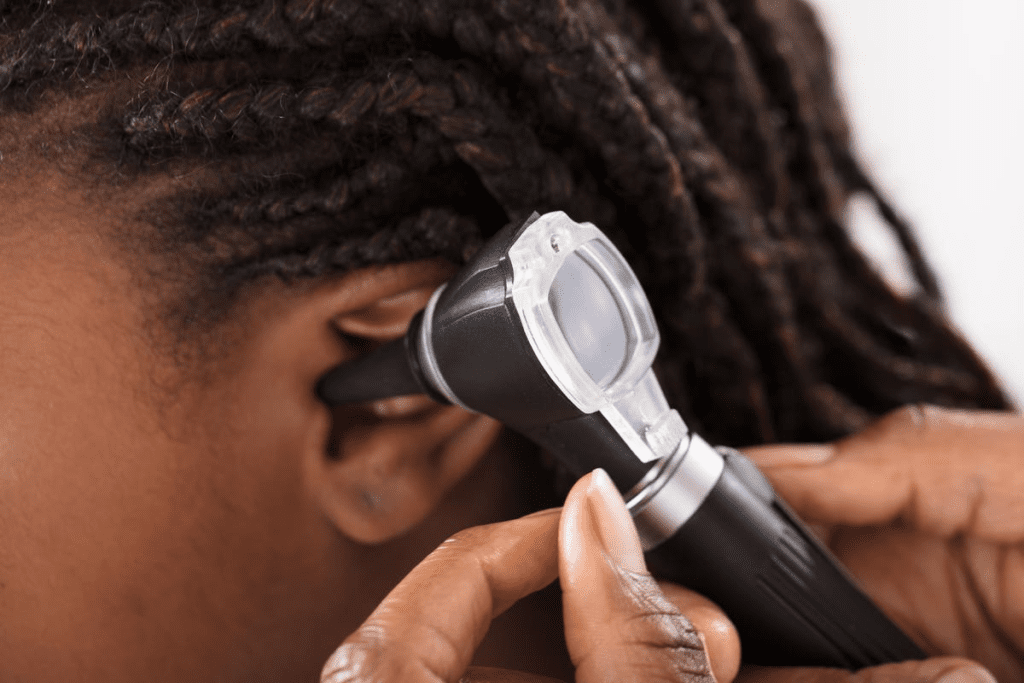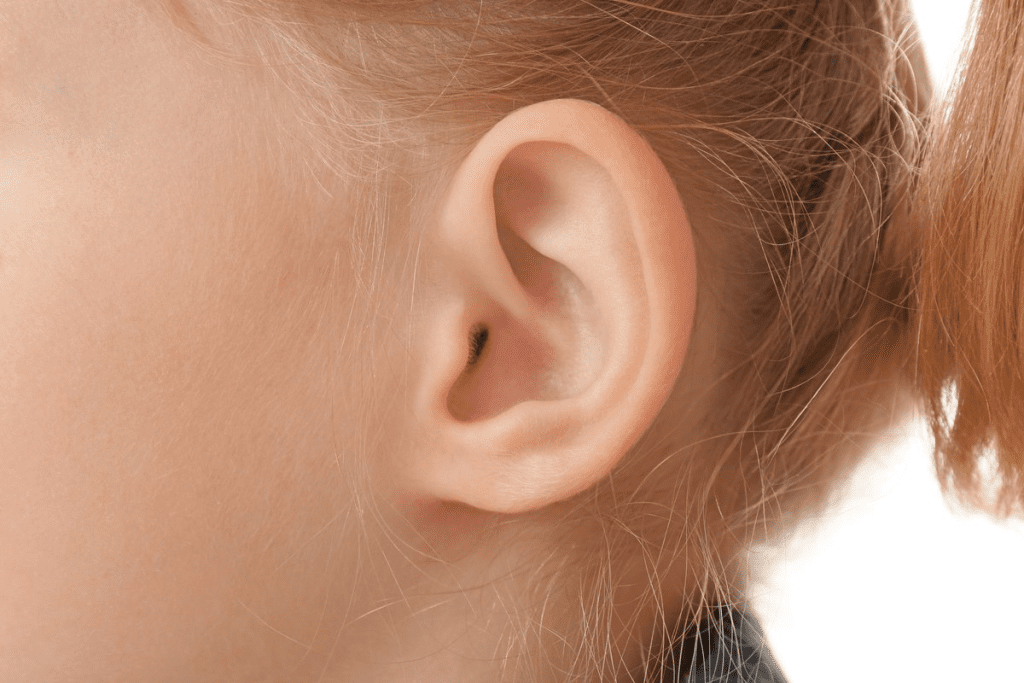
Ear infection is one of the most common health issues in children and can lead to serious problems if left untreated. Studies show that ongoing or repeated infections might cause hearing loss ” temporary or, in some cases, permanent in up to 12.5% of severe cases.
Ear infections are very common in babies and toddlers. The National Institutes of Health say that five out of six children will get an ear infection before they are three years old. We at the leading healthcare institution stress the importance of early diagnosis and proven treatments to avoid long-term issues.
Key Takeaways
- Untreated ear infections can cause hearing loss in children.
- Up to 12.5% of complicated cases may result in permanent hearing loss.
- Ear infections are very common in children under three.
- Early diagnosis and treatment are key to preventing long-term problems.
- Evidence-based treatments can greatly improve results.
Understanding Childhood Ear Infections
It’s important to know about ear infections in kids to catch them early. These infections, or otitis media, happen when the middle ear gets inflamed. This is often because of trapped bacteria or viruses. Kids get these infections a lot because their immune systems are growing and their eustachian tubes are smaller and more horizontal.
Types of Ear Infections in Children

There are a few kinds of ear infections that can hit kids. These include:
- Acute Otitis Media (AOM): This is the most common, with symptoms like ear pain and fever.
- Otitis Media with Effusion (OME): This happens when fluid stays in the middle ear after an infection goes away, causing hearing problems.
- Chronic Otitis Media: This is when ear infections keep coming back or never go away, leading to serious issues if not treated.
Each type needs a different treatment plan. Knowing the exact type of infection is key to picking the right treatment. Hopkins Medicine says it’s vital to understand the type of infection for the best treatment.
Prevalence: Why More Than Half of Children Experience Ear Infections by Age Three
Ear infections are super common in young kids. More than half of them get at least one by age three. This is because of:
- The shape of a child’s ear, like the eustachian tube, which is different from adults.
- Immature immune systems that can’t fight off infections well.
- Being around bacteria and viruses, like in daycare or with siblings.
Spotting the signs of ear infection, like ear pain, fever, and crankiness, is important. Getting medical help early can stop problems and help with hearing and language skills.
7 Warning Signs of a Serious Ear Infection That Requires Treatment
It’s important for parents to know the signs of a serious ear infection. This ensures their child gets the medical help they need. Ear infections can cause a lot of pain and serious problems if not treated.
Physical Symptoms to Watch For
Physical signs are often the first clue of an ear infection. Ear pain is a key symptom. Young children might tug or pull at their ears because they can’t say they’re in pain.
Other signs include:

- Fever, which can sometimes be high
- Fluid draining from the ear
- Redness or swelling of the outer ear
- Loss of balance or clumsiness
These symptoms can show up in different ways. But they usually mean something is wrong. It’s important for parents to watch for these signs, as they can mean a child needs to see a doctor.
Behavioural Changes That Indicate Ear Pain
Children with ear infections might act differently because of the pain. They might:
- Be more irritable or fussy
- Have trouble sleeping or be restless at night
- Have trouble hearing or responding to sounds
- Change how they eat or drink
These changes can be small or big, depending on the child and the infection. Irritability and sleep problems are common. This is because lying down can make the pain worse.
Not treating ear infections can lead to bigger problems. These include speech delays, school issues, and behavioural problems. So, knowing the symptoms of ear infection and signs of an ear infection is key to getting children the care they need.
Hearing Loss: The Most Common Consequence of Untreated Ear Infections
Untreated ear infections can have a big impact on a child’s hearing. Studies show that these infections can cause hearing loss. This loss can be temporary but can last forever in up to 12.5% of cases.
Fluid builds up in the middle ear during an infection, which can make hearing harder. This problem often goes away once the infection is treated. But, if not treated, the damage can last longer.
Temporary Hearing Impairment: What Parents Should Know
Many times, hearing loss from ear infections is only temporary. Effective ear infection treatment, like antibiotics for ear infection when needed, can fix the hearing. Parents need to know:
- Temporary hearing loss can slow down speech and language skills.
- It’s important to watch a child’s hearing and speech after an infection.
- Getting advice from a healthcare professional on how to treat ear infection is key.
Most ear infections get better on their own, but some need medical help. Doctors decide if antibiotics are needed based on the child’s age and the infection’s severity.
Permanent Damage: When 12.5% of Cases Lead to Lasting Problems
While many ear infections don’t cause permanent hearing loss, a big number can. Untreated or recurrent infections can lead to:
- Permanent hearing loss, making it hard to hear and understand speech.
- Long-term effects on speech and language skills.
- More chances of school and social problems because of hearing issues.
Health experts say, “Early treatment of ear infections is key to avoid long-term hearing loss.” So, parents should get medical help if they think their child has an ear infection.
“Early diagnosis and treatment of ear infections are critical to preventing long-term hearing loss and related complications.”
In summary, while many kids get better from ear infections, the risk of hearing loss is real. Both temporary and permanent hearing loss highlight the need for quick and right ear infection treatment. Parents should team up with doctors to make sure their child gets the right care.
How Untreated Ear Infections Affect Speech and Language Development
Untreated ear infections can greatly affect a child’s speech and language skills. They can cause hearing loss, which is key for learning language. Early hearing problems can lead to permanent changes in how we process sound, affecting language and thinking skills.
Critical Windows for Language Acquisition
The first three years of life are when language skills grow the fastest. It’s a time when kids learn and soak up language sounds, rhythms, and structures. Untreated ear infections can disrupt this by causing hearing loss, making it hard for kids to tell similar sounds apart or understand complex sentences.
A leading pediatric audiologist said,
“Hearing loss from untreated ear infections can delay speech and language skills, leading to long-term communication challenges.”
This shows why it’s so important to catch and treat ear infections early to avoid these problems.
Long-term Communication Challenges
Ear infections left untreated can cause lasting hearing issues, affecting how well a child can communicate. This can make it hard for them to speak clearly, understand, and interact socially. The effects on a child’s self-esteem and school performance can be big, as they might fall behind their peers because of hearing loss.
We must act fast to stop these long-term communication problems. By understanding the dangers of untreated ear infections and acting early, we can help kids develop the speech and language skills they need to succeed.
Academic and Cognitive Impacts of Chronic Ear Infections
Chronic ear infections can greatly affect a child’s school success and brain growth. These infections can cause ongoing hearing problems. This can make it hard for kids to learn and understand things well.
Learning Difficulties in School-Age Children
Recurring ear infections can be a big problem in school. The hearing loss they cause can make it tough for kids to listen and learn. This can lead to falling behind in school and feeling less confident.
It’s also important to watch for signs of ear infection. Symptoms like ear pain, trouble hearing, or being easily upset can mean an infection. Catching and treating these infections early is key to avoiding lasting problems.
Effects on Central Auditory Processing and Cognitive Development
Chronic ear infections can mess with a child’s ability to understand sounds. This can make it hard for them to pick out different sounds, hear in noisy places, and follow directions. It can also hurt their language skills and how they communicate.
Studies show that kids with frequent ear infections might need surgery to help. This surgery, called tympanostomy tubes, helps air flow and stops fluid buildup. It can help prevent more infections and hearing loss.
When dealing with ear infection and its effects, we must think about both the symptoms now and the future. Knowing how chronic ear infections can affect learning and thinking helps us support kids better. This way, they can reach their full abilities.
For kids with ongoing infections, talking to a doctor about an infected ear remedy is a good step. Early action can greatly improve a child’s life and school performance.
Severe Medical Complications That Can Develop Without Treatment
Ear infections can get worse if not treated. They can spread to other parts of the head. This can lead to serious and even life-threatening conditions.
Mastoiditis and Labyrinthitis: When Infection Spreads
Untreated ear infections can cause mastoiditis. This is an infection of the bone behind the ear. Mastoiditis can cause fever, headache, and swelling. It’s a serious condition.
Labyrinthitis is another complication. It’s an inner ear disorder caused by infection. Symptoms include dizziness and hearing loss.
Life-Threatening Conditions: Meningitis and Brain Abscess
In severe cases, the infection can reach the meninges. This is the protective layer around the brain and spinal cord. Meningitis is a serious condition that needs immediate care. Symptoms include severe headache, fever, and stiff neck.
Another serious complication is a brain abscess. This is when the infection spreads to the brain. It can cause severe headaches, confusion, and seizures. It needs quick treatment.
Structural Damage: Eardrum Rupture and Balance Disorders
Untreated ear infections can damage the ear’s structure. The pressure can cause the eardrum to rupture. While it can heal, it may lead to hearing loss and more infections.
Inner ear infections can also affect balance. This can cause vertigo and balance disorders.
Parents should seek medical help if they think their child has an ear infection. Early treatment with antibiotics can prevent serious complications. Knowing the symptoms is important for timely treatment.
Conclusion: The Importance of Timely Treatment for Children’s Ear Health
Ear infections are common in kids, with over half getting one by age three. It’s key to spot ear infection symptoms baby early for treatment. If not treated, ear infections can cause serious problems like hearing loss and speech issues.
We focus on quick diagnosis and effective treatments at our healthcare center. We aim to give top-notch care to kids with ear infections. This helps prevent serious issues later on. Knowing how to get rid of ear infection is vital for parents to ease their child’s pain and avoid complications.
Acting fast on ear infection can prevent serious issues. Quick medical help ensures kids recover well and avoid long-term hearing and speech problems.
FAQ
What are the common symptoms of an ear infection in children?
Symptoms include ear pain, fever, and irritability. Your child might also have trouble sleeping or show discharge from the ear. If you see these signs, get medical help right away.
How can untreated ear infections affect a child’s hearing?
Untreated infections can cause hearing loss. Fluid in the ear might make hearing worse temporarily. But, serious or repeated infections can harm hearing permanently.
Can ear infections impact a child’s speech and language development?
Yes, they can. Untreated infections can hurt speech and language skills. Hearing loss during important learning times can lead to communication problems later on.
What are the possible academic consequences of chronic ear infections?
Chronic infections can make learning hard. Hearing loss and infections can affect how the brain processes sound and learn. This can hurt a child’s school performance.
Can ear infections lead to severe medical complications if left untreated?
Yes, they can. Untreated infections can cause serious problems like mastoiditis and meningitis. These are life-threatening and need quick medical care.
How can I identify if my child has a serious ear infection that requires medical attention?
Look for severe ear pain, high fever, and vomiting. Discharge from the ear and changes in behavior are also warning signs. These can mean a serious infection.
What is the best way to treat an ear infection?
Treatment usually includes antibiotics. Sometimes, tubes are needed to drain fluid. We choose treatments based on your child’s needs.
How can I prevent ear infections in my child?
You can’t prevent all infections, but some steps help. Breastfeeding, avoiding smoke, and good hygiene are good. Regular doctor visits can catch problems early.
What are the signs of an ear infection in infants?
Infants might tug at their ears, have fever, or seem irritable. Changes in appetite or sleep are also signs. If you think your baby has an infection, see a doctor.
Can ear infections be treated without antibiotics?
Sometimes, infections go away on their own. But, antibiotics are often needed to prevent serious problems. We decide on treatment based on each case.
References
- Jamal, A. (2022). Effect of Ear Infections on Hearing Ability: A Narrative Review. Cureus. https://www.ncbi.nlm.nih.gov/pmc/articles/PMC9419542/
- Sethi, R. (2024). Prevalence of Ear Disease and Associated Hearing Loss: Cross-sectional Study. PubMed. https://pubmed.ncbi.nlm.nih.gov/38440611/









